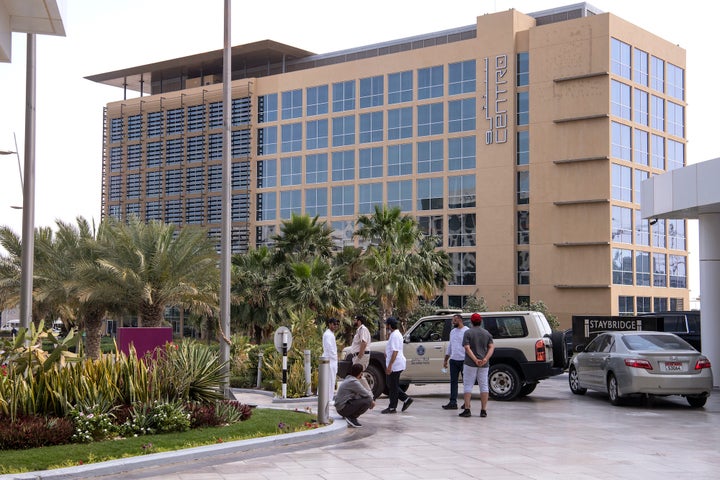Coronavirus is a two-pronged threat for the peloton’s top teams. Not only is there a risk of infection from the highly contagious virus, but also quarantine.
After riders and staff were confined in an Abu Dhabi hotel following the shutdown of the UAE Tour last month, teams are being extra cautious when it comes to deciding when to deploy riders, under the shroud of COVID-19.
“Quarantine is definitely a fear,” Mitchelton-Scott sport director Matt White told VeloNews. “If you have riders locked away for two weeks in a hotel room without a bike, you can say goodbye to the rest of spring.”
As the coronavirus scare continues to disrupt the racing calendar, teams across the men’s and women’s peloton continue to juggle their respective racing plans. It Italy, a national ban on public gatherings and a quarantine across the Lombardia region imposed Sunday saw the much of the Italian spring calendar wiped off the schedule.
Paris-Nice started Sunday under a mixed cloud of anxiety and hope. Several teams defiantly lined up to race. The first stage unfolded without mishap, but on Friday, Jumbo-Visma joined six other WorldTour teams that decided not to start the French eight-day stage race.
“Cycling has a unique character, and traveling and staying in hotels is inherent to the sport,” said Jumbo-Visma manager Richard Plugge. “That makes us vulnerable in this coronavirus crisis. The health of riders, staff and public now deserves our priority. We also take into account circumstances that may arise such as quarantine, illness or hospitalization.”
Not only are teams expressing concern about the risk of infection and the welfare of their riders and staff, team managers don’t want to see a repeat of the nightmare scenario that played out in Abu Dhabi.

Last month, when teams trundled off to the United Arab Emirates to start the season’s second WorldTour stage race, coronavirus was little more than a blip on a map in central China. Things quickly accelerated into chaos when two team staffers revealed flu-like symptoms. Local authorities canceled the final two stages, locked down the race entourage, and conducted a wave of improvised health tests.
After nearly four days of lockdown, a first wave of riders and staffers were cleared to leave. Some journalists even clandestinely dashed away once they were given the all clear. Others waiting for shuttle buses were stopped short for a new round of tests.
Most eventually got away, but Cofidis and Groupama-FDJ remained isolated in hotel rooms nearly two more weeks, and only got the green light to leave the UAE just this past weekend. UAE-Emirates is still sequestering its staff and riders, including Tadej Pogacar and Fernando Gaviria, in voluntary lockdown.
Team managers and sport directors have looked on horror at the implications for their riders if other races descended into similar disarray.
It’s that double uncertainty of possible infection and quarantine that drove many of the WorldTour teams to hit the pause button in what’s an unprecedented challenge to the sport.
“That could have been my team,” White said of the UAE lockdown. “It’s hit or miss about what’s happening right now. That’s one reason why we’ve put a pause on racing. We want our riders and staff to avoid being quarantined.”
Mitchelton-Scott pulled its men’s and women’s teams out of racing until late March, with hopes that the situation will stabilize in the coming weeks.
Over the weekend, not only was the Italian pro racing calendar erased for the month of March, Italian authorities imposed a quarantine on much of northern Italy that strictly limits travel. Most teams stopped short of sending its staffers into Italy over the weekend for Strade Bianche and Tirreno-Adriatico for fear of that exact scenario.
For example, Israel Start-Up Nation told its drivers Thursday to stop team vehicles in France while en route to Italy from northern Spain to await word. Once it was confirmed that Strade Bianche would be rescheduled, staffers turned around without having crossed into Italy. Other teams followed a similar plan.
This week, Paris-Nice is trying to thread the needle, and push the race all the way to the Cote d’Azur under approval of national sport and health authorities. Race organizers have taken extra steps both during the race and at team hotels to try to create healthier conditions for riders and staff in the race caravan.
Paris-Nice often sees horrible weather across northern France until it breaks into milder conditions in Provence. White expressed fears that if someone comes down even with a fever the race could be impacted.

“People get sick every year at Paris-Nice,” White said. “What’s stopping [authorities] from over-reacting and imposing a quarantine? The problem is that every country is making up their own rules.”
Many are hopeful that Paris-Nice can be raced without disruption. That would send an important marker for upcoming races such as the Volta a Catalunya in northern Spain, and the northern classics that loom on the men’s WorldTour calendar.
But if things do go off the rails, teams like Mitchelton-Scott and others won’t be exposing their riders and staff to the uncertainty of what might follow.
